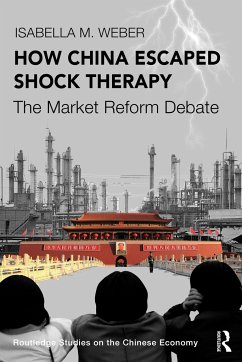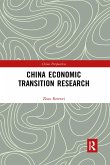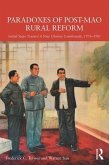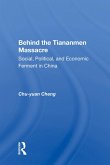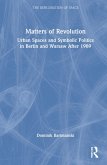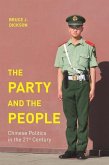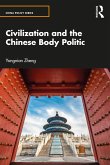China has become deeply integrated into the world economy. Yet, gradual marketization has facilitated the country's rise without leading to its wholesale assimilation to global neoliberalism. This book uncovers the fierce contest about economic reforms that shaped China's path. In the first post-Mao decade, China's reformers were sharply divided. They agreed that China had to reform its economic system and move toward more marketization-but struggled over how to go about it. Should China destroy the core of the socialist system through shock therapy, or should it use the institutions of the planned economy as market creators? With hindsight, the historical record proves the high stakes behind the question: China embarked on an economic expansion commonly described as unprecedented in scope and pace, whereas Russia's economy collapsed under shock therapy. Based on extensive research, including interviews with key Chinese and international participants and World Bank officials as well as insights gleaned from unpublished documents, the book charts the debate that ultimately enabled China to follow a path to gradual reindustrialization. Beyond shedding light on the crossroads of the 1980s, it reveals the intellectual foundations of state-market relations in reform-era China through a longue durée lens. Overall, the book delivers an original perspective on China's economic model and its continuing contestations from within and from without.
German edition winner of the Hans Matthöfer Prize for Public Writing in Economics 2024, awarded by the Friedrich Ebert Foundation
Winner of the 2021 Joan Robinson Prize awarded by the European Association for Evolutionary Political Economy.
Winner of the 2022 Best Book in Interdisciplinary Studies Award of the International Studies Association.
One of the most consequential economic debates in China over the direction of reform took place in the 1980s and focused on how markets should be created. The outcome of that debate set the pattern for much of China's subsequent economic reforms. Isabella Weber, drawing on interviews of the participants and others together with many new sources of unpublished and published information, does a masterful job of explaining how this debate evolved and its ultimate impact.
DWIGHT H. PERKINS, Harvard University, Director of the Harvard Institute for International Development, 1980-1995
This superb book presents the most compelling interpretation I have read of the sources of Chinese gradualism and its success in fostering economic growth and transformation while preserving enough social cohesion to hold the Chinese society together. It is the product of an independent, inquisitive, open mind-the only type that can hope to grasp the phenomenon that is modern China. It is also the work of a first-rate economist, in the best sense of that term.
JAMES K. GALBRAITH, The University of Texas at Austin, former Chief Technical adviser to China's State Planning Commission for macroeconomic reform
Isabella Weber's book gives an excellent historical overview of China's economic statecraft bringing the reader to the crucial period of market reforms and to the decision to avoid the full implementation of the neoliberal agenda, thus setting the stage for the fastest and longest growth in world history.
BRANKO MILANOVIC, LSE and CUNY, former Lead Economist, World Bank Research Department
Isabella Weber succeeds in offering a powerful account of China's reform-era market creation that is of acute interest to economists and historians alike. Her book is a call to economists to ponder the relevance of political economy with its European roots in classical economics of the early modern era and with Chinese roots in a period almost two millennia earlier.
R. BIN WONG, Director of the UCLA Asia Institute and Distinguished Professor of History
China's debates in the 1980s about reform of the non-market economy are centrally important to understanding global political economy in the 21st century. The resolution of the debates about the 'Big Bang' set China on the course of pragmatic system reform ('groping for stones to cross the river') that has remained in place ever since. Isabella Weber's study is unique. It uses information not only from a wide array of written documents but also from extensive interviews with participants in the debates. Her remarkable book provides a rich, balanced and scholarly analysis which illuminates the complex reality of this critically important period in modern world history.
PETER NOLAN, University of Cambridge, Founding Director of the University's Centre of Development Studies
This book is a must read for anybody interested in the history of China's economic reforms, and I warmly recommend it. It is a highly readable and extremely valuable contribution to the debate on China's early reform efforts in the 1980s. The book's most valuable contribution draws from Weber's extensive interviews with the reformers.
BERT HOFMAN, former World Bank Country Director for China, Mongolia and Korea
Her efforts to interview the participants and her extensive research, in both public and private archives, make her account the standard against which future books will be measured.
REBECCA KARL, London Review of Books
How China Escaped Shock Therapy constitutes an impressive work of intellectual history. Weber presents an exceedingly thorough, nuanced and even exciting account of the debate, which was fluid and constantly changing.
CARL RISKIN, China Quarterly
Weber's book offers a fascinating account of struggles over economic policy in China in the 1980s. It is all the more fascinating to read Weber's subtle recounting of this debate because it is with us still today in debates about inflation in Europe and the U.S. amid the COVID recovery. Weber's subtle, lucid and evenhanded treatment is to render 40-year-old debates in reform-era China neither exotic nor outdated, but strikingly contemporary.
ADAM TOOZE, Chartbook and No ma
This tension between China's rise and its only 'partial assimilation' defines our present moment, she writes. The purpose of How China Escaped Shock Therapy is to explain this divergence, which Weber does very well.
JOEL ANDREAS, New Left Review
Weber's book is well researched, based on Chinese language documents and dozens of interviews with key thinkers and actors in its economic reforms, and is informative and stimulating. It's an important book that deserves a wide readership. It offers a sober analysis of the intellectual and political struggles - that occurred on an international scale - that transformed China, and are having global repercussions. It provides key insights into 'how China works' and subtly demonstrates that neoliberalism is not the only game in town. It is one of the most thought-provoking and illuminating books I have read.
INDERJETT PARMAR, Professor of international Politics at City, University of London, and Visiting Professor at LSE IDEAS (the LSE's foreign policy think tank)
Isabella Weber's meticulously researched monograph tells the story of China's fortunate break with the international economic policy mainstream, which allowed the country to escape Russia's dismal fate. Isabella Weber's extraordinarily detailed analysis of the economic policy debates around price reforms offers several lessons for today. Shock therapy has changed but market-fundamentalism is still on the agenda. The combination of historical depth with theoretical insights that also speak to contemporary debates makes How China Escaped Shock Therapy a benchmark monograph in the literature on the political economy of China and shock therapy.
GABOR SCHEIRING Marie Curie Fellow at Bocconi University
Winner of the 2021 Joan Robinson Prize awarded by the European Association for Evolutionary Political Economy.
Winner of the 2022 Best Book in Interdisciplinary Studies Award of the International Studies Association.
One of the most consequential economic debates in China over the direction of reform took place in the 1980s and focused on how markets should be created. The outcome of that debate set the pattern for much of China's subsequent economic reforms. Isabella Weber, drawing on interviews of the participants and others together with many new sources of unpublished and published information, does a masterful job of explaining how this debate evolved and its ultimate impact.
DWIGHT H. PERKINS, Harvard University, Director of the Harvard Institute for International Development, 1980-1995
This superb book presents the most compelling interpretation I have read of the sources of Chinese gradualism and its success in fostering economic growth and transformation while preserving enough social cohesion to hold the Chinese society together. It is the product of an independent, inquisitive, open mind-the only type that can hope to grasp the phenomenon that is modern China. It is also the work of a first-rate economist, in the best sense of that term.
JAMES K. GALBRAITH, The University of Texas at Austin, former Chief Technical adviser to China's State Planning Commission for macroeconomic reform
Isabella Weber's book gives an excellent historical overview of China's economic statecraft bringing the reader to the crucial period of market reforms and to the decision to avoid the full implementation of the neoliberal agenda, thus setting the stage for the fastest and longest growth in world history.
BRANKO MILANOVIC, LSE and CUNY, former Lead Economist, World Bank Research Department
Isabella Weber succeeds in offering a powerful account of China's reform-era market creation that is of acute interest to economists and historians alike. Her book is a call to economists to ponder the relevance of political economy with its European roots in classical economics of the early modern era and with Chinese roots in a period almost two millennia earlier.
R. BIN WONG, Director of the UCLA Asia Institute and Distinguished Professor of History
China's debates in the 1980s about reform of the non-market economy are centrally important to understanding global political economy in the 21st century. The resolution of the debates about the 'Big Bang' set China on the course of pragmatic system reform ('groping for stones to cross the river') that has remained in place ever since. Isabella Weber's study is unique. It uses information not only from a wide array of written documents but also from extensive interviews with participants in the debates. Her remarkable book provides a rich, balanced and scholarly analysis which illuminates the complex reality of this critically important period in modern world history.
PETER NOLAN, University of Cambridge, Founding Director of the University's Centre of Development Studies
This book is a must read for anybody interested in the history of China's economic reforms, and I warmly recommend it. It is a highly readable and extremely valuable contribution to the debate on China's early reform efforts in the 1980s. The book's most valuable contribution draws from Weber's extensive interviews with the reformers.
BERT HOFMAN, former World Bank Country Director for China, Mongolia and Korea
Her efforts to interview the participants and her extensive research, in both public and private archives, make her account the standard against which future books will be measured.
REBECCA KARL, London Review of Books
How China Escaped Shock Therapy constitutes an impressive work of intellectual history. Weber presents an exceedingly thorough, nuanced and even exciting account of the debate, which was fluid and constantly changing.
CARL RISKIN, China Quarterly
Weber's book offers a fascinating account of struggles over economic policy in China in the 1980s. It is all the more fascinating to read Weber's subtle recounting of this debate because it is with us still today in debates about inflation in Europe and the U.S. amid the COVID recovery. Weber's subtle, lucid and evenhanded treatment is to render 40-year-old debates in reform-era China neither exotic nor outdated, but strikingly contemporary.
ADAM TOOZE, Chartbook and No ma
This tension between China's rise and its only 'partial assimilation' defines our present moment, she writes. The purpose of How China Escaped Shock Therapy is to explain this divergence, which Weber does very well.
JOEL ANDREAS, New Left Review
Weber's book is well researched, based on Chinese language documents and dozens of interviews with key thinkers and actors in its economic reforms, and is informative and stimulating. It's an important book that deserves a wide readership. It offers a sober analysis of the intellectual and political struggles - that occurred on an international scale - that transformed China, and are having global repercussions. It provides key insights into 'how China works' and subtly demonstrates that neoliberalism is not the only game in town. It is one of the most thought-provoking and illuminating books I have read.
INDERJETT PARMAR, Professor of international Politics at City, University of London, and Visiting Professor at LSE IDEAS (the LSE's foreign policy think tank)
Isabella Weber's meticulously researched monograph tells the story of China's fortunate break with the international economic policy mainstream, which allowed the country to escape Russia's dismal fate. Isabella Weber's extraordinarily detailed analysis of the economic policy debates around price reforms offers several lessons for today. Shock therapy has changed but market-fundamentalism is still on the agenda. The combination of historical depth with theoretical insights that also speak to contemporary debates makes How China Escaped Shock Therapy a benchmark monograph in the literature on the political economy of China and shock therapy.
GABOR SCHEIRING Marie Curie Fellow at Bocconi University

